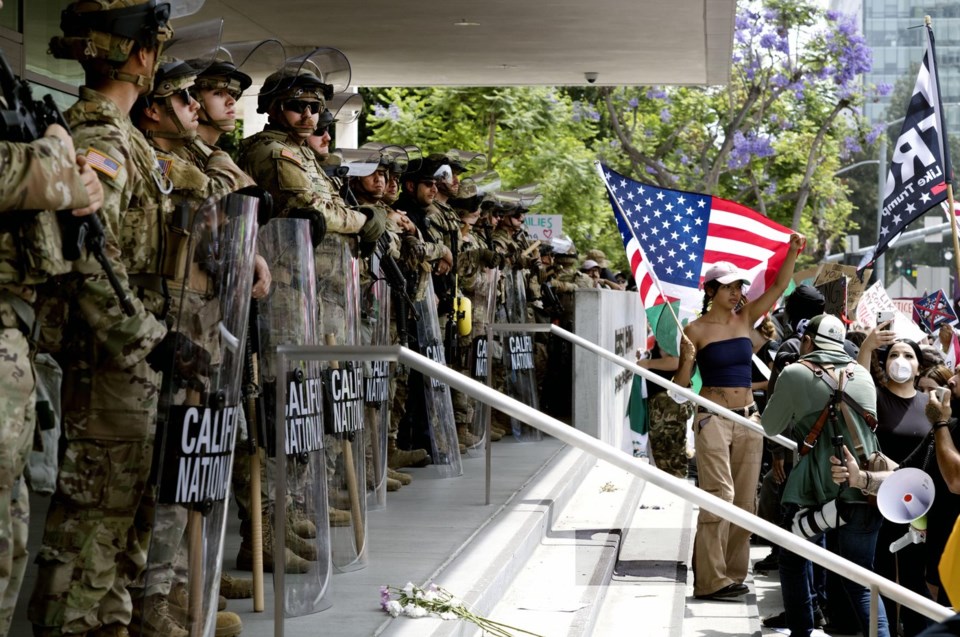SAN FRANCISCO (AP) — A federal judge in San Francisco is weighing whether the Trump administration violated federal law by sending National Guard troops to accompany immigration agents on raids in Southern California.
A three-day trial on the matter concluded Wednesday.
California has argued the troops violated the Posse Comitatus Act, which generally prohibits military enforcement of domestic laws. Lawyers for the administration said the law doesn’t apply because President Donald Trump called up the National Guard under an authority that allows their deployment if "the president is unable with the regular forces to execute the laws of the United States.”
Federal and military officials were called to testify, and the trial's third day largely focused on weedy arguments about the 1878 law and whether the court even had a role in determining the limits of presidential power.
Trump deployed 4,000 National Guard members and later 700 Marines to Los Angeles in June after protests in response to immigration raids around the city. They were originally deployed to protect federal property, including a detention center targeted by protesters. The Guard members later began guarding agents as they continued arresting people suspected of being in the U.S. illegally. Between 250 and 300 Guard troops remain and have been activated through November.
Wednesday's arguments
Deputy Assistant Deputy Assistant Attorney General Eric Hamilton said Wednesday that the Posse Comitatus Act does not apply because the Guard was deployed under a section of U.S. Code that allows the president to call any state's guard into federal service when the country “is invaded,” when “there is a rebellion or danger of a rebellion against the authority of the Government,” or when the president is unable “to execute the laws of the United States.”
He said Guard members weren't engaged in law enforcement and were just providing backup security for federal agents.
“If the purpose is the protection of law enforcement officers, it isn't law enforcement in the first place,” he said. “On top of that, there’s the fact that a (president's) constitutional inherent protective power is at work. That is itself an exception to the Posse Comitatus Act.”
California Deputy Attorney General Meghan Strong argued the troops’ role went beyond providing protection to federal agents and buildings. The troops, she said, had “an active, direct role” enforcing the law when they detained people at least in two occasions and set up roadblocks and perimeters blocking access to public streets.
“For all the pretense and wordsmithing defendants have tried to employ, the facts are inescapable: The activities defendants have ordered Task Force 51 troops to engage in across Southern California violate the Posse Comitatus Act,” she said. Task Force 51 was the name of the command post activated to coordinate the troops deployment deployment.
The Trump administration, she said, broke the law by using the troops to illegally enforce civilian law and operate as a single force with federal immigration officers, who often don military garb.
California is asking Judge Charles Breyer to order the Trump administration to return control of the remaining troops to the state and to stop the federal government from using military troops in California “to execute or assist in the execution of federal law or any civilian law enforcement functions by any federal agent or officer.”
Judge weighs whether troops crossed the line
“The question in this case is whether the troops that have been stationed in Los Angeles have or have not crossed that line,” said David Levine, a professor at UC College of the Law San Francisco. “Are they acting as military or are they acting as police? They can’t act as police. They can only act within their bounds.”
Troops deployed to Southern California received at least 60 requests for assistance from federal officials and responded to the majority of them, Hamilton told the judge.
Army Maj. Gen. Scott Sherman, who commanded Task Force 51, said there were some times when troops outnumbered federal officers. He said that during an immigration enforcement at an illegal marijuana growing operation in Mecca, a desert community about 140 miles (225 kilometers) east of Los Angeles, about 300 task force soldiers were present, compared to 200 federal law enforcement agents.
National Guard troops also accompanied federal immigration officers on raids at two state-licensed marijuana nurseries in Ventura County and to an operation at MacArthur Park in downtown Los Angeles intended as a show of force against people in the U.S. illegally and those protesting the Trump administration’s immigration crackdown.
Sherman testified during the second day of the trial that he raised concerns the deployment could violate the Posse Comitatus Act.
He said soldiers were trained on the law and given materials that included a list of specific activities prohibited by the act, including doing security patrols and conducting traffic control, crowd control and riot control.
Sherman said that while the Posse Comitatus Act prohibits troops from carrying out those actions, he was told by his superiors that there was a “constitutional exception” that permitted such activities when the troops are protecting federal property or personnel.
Olga R. Rodriguez, The Associated Press



